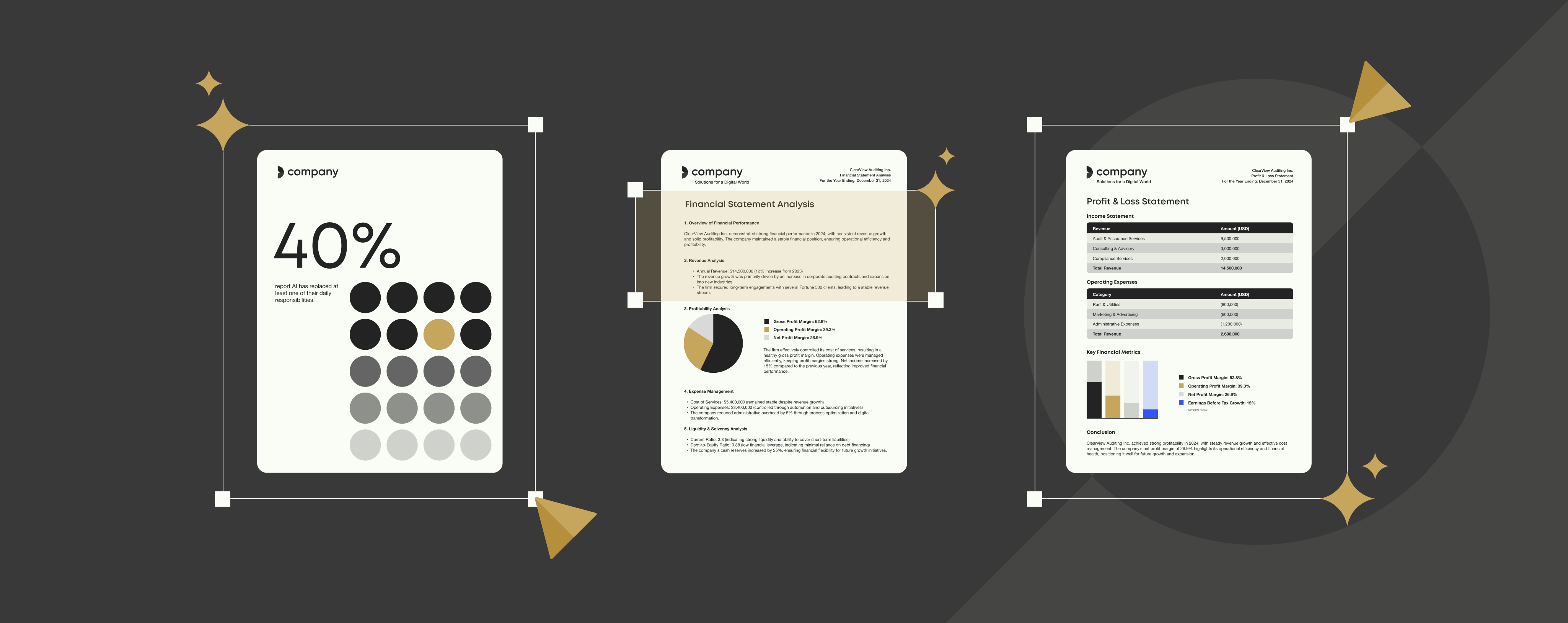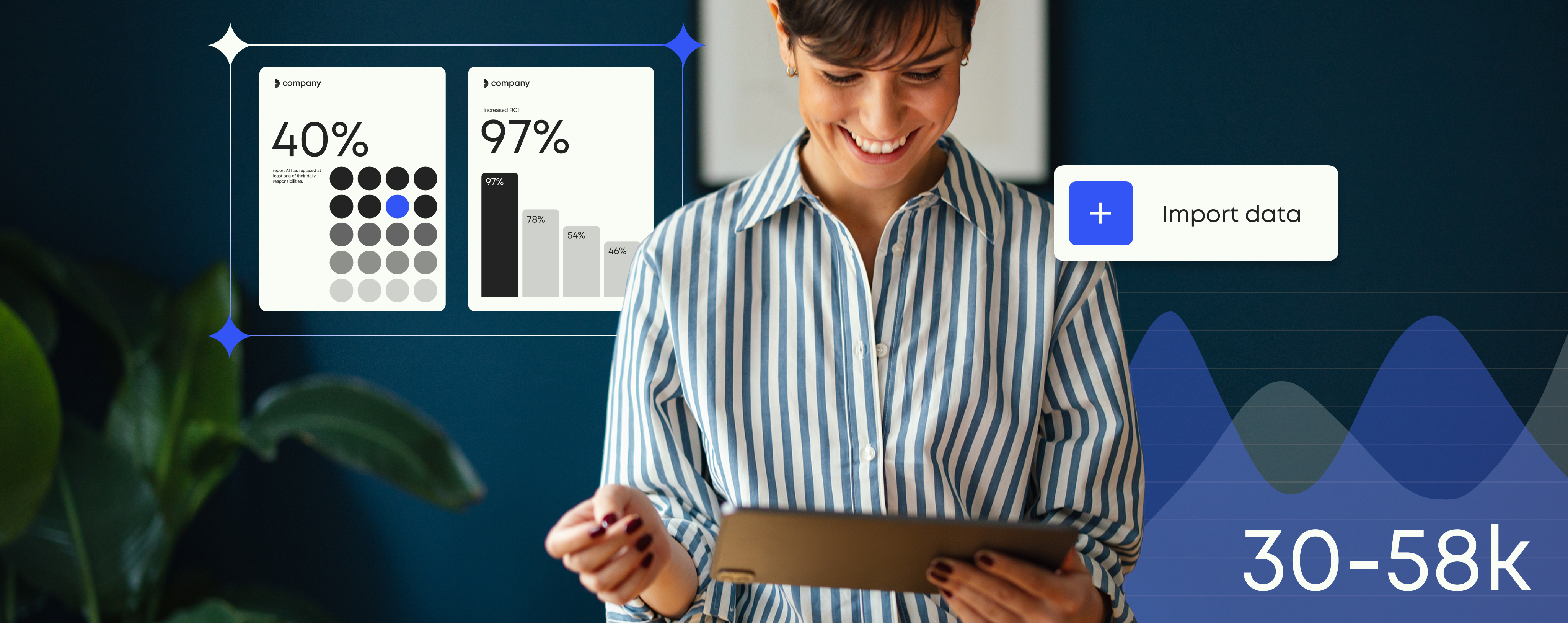AI agents: What they do, why it matters, and where to start

The AI agent market is growing 45% annually*
*(BCG)
Just when we thought we had GenAI figured out, there’s a new bot on the scene: the AI agent.
AI agents are like personal assistants. They take on tasks, make decisions, and keep workflows running with little human input. Whether it’s drafting emails or organizing schedules, these digital helpers handle the busywork so employees can focus on what really matters.
With the AI agent market set to grow 45% each year over the next five years, early adopters will have a huge competitive advantage. But figuring out how to embed new technology into daily workflows for maximum ROI is complicated—especially when it’s moving this fast.
In this blog, we’ll cut through the complexity to explore what AI agents are, how they work, and the timesaving and productivity benefits they’re already showing in the workplace.
What is an AI agent?
Simply put, AI agents are intelligent programs that act like virtual assistants, using a variety of tools to accomplish specific goals.
Using an AI agent is pretty straightforward. Basically, a human provides the AI agent with a goal, such as drafting an email for a client. The AI agent then operates independently, selecting the best approach and tools to complete the task effectively.
At their core, AI agents rely on an AI model (for example, an LLM like GPT) to determine the best way to tackle a task. They can then call on external tools like calculators, web search engines, or scheduling apps; as well as internal systems such as CRM platforms or cloud storage services, to get the job done. By making decisions and taking action on their own, AI agents can operate with minimal input from humans.
ai
Key features of AI agents
- Autonomy:
They take initiative, starting and completing tasks without constant input. - Adaptability:
AI agents learn from past actions, refining and improving their performance over time. - Efficiency:
By handling repetitive tasks, they free up time and boost overall productivity. - Context awareness:
Powered by large language models (LLMs), they understand the context of conversations and actions, making smarter, more relevant decisions.
Example: An AI agent in action
In October 2024, Microsoft launched Copilot Studio, a platform that enables businesses to create custom AI agents. These AI agents can automate workflows across tools like Teams, Outlook, and SharePoint, taking care of repetitive tasks and allowing employees to focus on more meaningful work.
How it works
Let’s say a consulting firm wants to speed up the process of preparing client engagement letters. They create an AI agent with Copilot Studio to manage the workflow that looks something like this:
- Trigger the process: A salesperson updates the CRM (e.g. marking a deal as “Won”), automatically activating the AI agent.
- Collect information: The agent retrieves client details like names, addresses, and service agreements.
- Generate the document: Using brand-approved templates, the agent fills in the details to create a polished, on-brand engagement letter.
- Review and approve: The draft is sent to the salesperson for final approval.
- Complete final actions: Once approved, the agent updates the CRM, emails the document to the client, and logs the process as complete.
This example shows how AI agents combine decision-making, data collection, and task execution.
The agent:
- Automatically triggered the workflow after the CRM update.
- Retrieved relevant client data from the CRM without manual input.
- Used templates to generate the document autonomously.
- Completed final tasks like emailing the document and updating the CRM.
The key here is balancing automation with human oversight (for review and approval). When we get this right, AI agents can make workflows smarter, faster, and more reliable.
How to create an AI agent that’s right for you
The right AI agent tool can transform how your employees carry out just about any task. But with so many options available, it’s important to choose the use cases that make the most sense.
Start by considering the tools your team already relies on and identifying the workflows you want to improve. Do you need seamless integration with existing systems, or are you looking for a tool that can handle complex, custom tasks?
Below, we’ve highlighted a few AI agent platforms, complete with their standout features, and the types of organizations they’re best suited for. These examples will help you understand what to look for when deciding on the right AI agent tool for your company.
1. Microsoft’s Copilot Studio
As previously described, Microsoft’s Copilot Studio helps businesses create custom AI agents that automate workflows in Microsoft 365 tools like Teams, Outlook, and SharePoint.
- Why it’s popular: Its low-code design makes it accessible for non-technical teams.
- Best for: Organizations that already use Microsoft 365 and have invested in Copilot.
2. Salesforce Einstein
Salesforce Einstein adds AI-powered automation to Salesforce’s CRM, streamlining customer service, sales, and marketing.
- Why it’s popular: It uses existing CRM data to predict behaviors and improve customer interactions.
- Best for: Businesses with a strong focus on CRM.
3. OpenAI API
OpenAI’s API allows businesses to create custom AI agents using GPT models for natural language tasks and automation.
- Why it’s popular: Its advanced language capabilities make it perfect for nuanced tasks like drafting content or analyzing feedback.
- Best for: Companies with technical resources to build custom solutions.
ADDITIONAL CONTENT
Stay ahead with GenAI.
The second wave of GenAI is here, and it will belong to businesses that make AI a core part of their daily workflows.
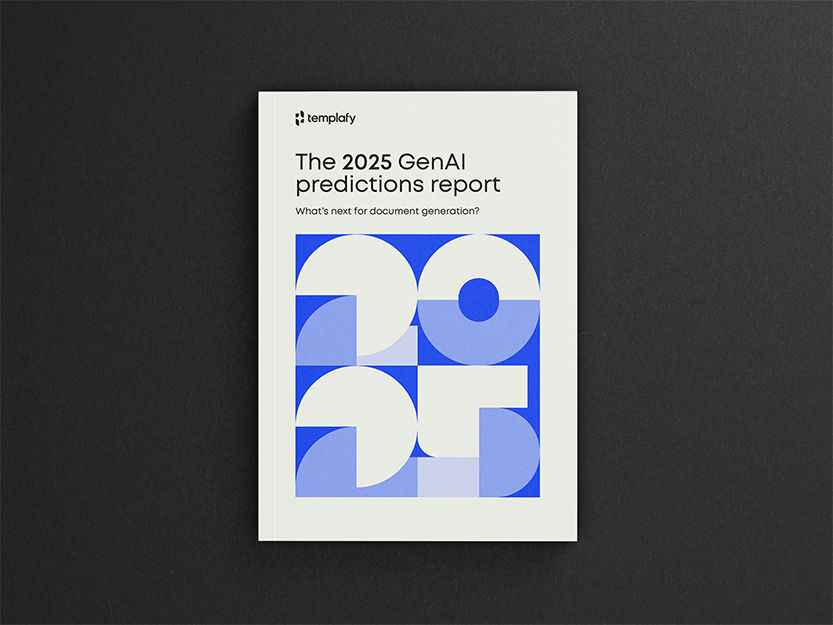

The future of document generation
GenAI has already transformed document generation. According to a McKinsey survey from early 2024, 65% of organizations are regularly using GenAI, nearly doubling adoption rates from the previous year. To get the most out of AI investments, it’s important to focus on clear, high-impact use cases, and document generation is proving to be one of the most valuable.
Document generation today
The best document generation platforms are already using many different technologies to automate document work. For example, Templafy combines rules-based automation with managed AI to help enterprises maintain full control over how, where, and when AI is used—ensuring it always aligns with business goals.
Rules-based automation sets the foundation by enforcing key guidelines, such as brand consistency and compliance. Then, managed AI takes it a step further by processing complex data inputs to create and personalize content.
These tools have already made a significant impact by reducing errors, saving time, and boosting efficiency. But they’re not quite running the show on their own just yet.
How AI agents will fit in
Business teams can become more productive when they delegate repetitive document tasks to AI agents. This frees them up to focus on work that requires a human touch, like building relationships or engaging with customers, which brings greater value to their organization.Here’s what AI agents are already doing to revolutionize document workflows:
- Data retrieval: Automatically pulling client information from systems like CRMs or databases to ensure accuracy and up-to-date content.
- Document creation: Generating customized, on-brand documents—such as proposals, reports, or contracts—using pre-approved templates.
- Compliance checks: Ensuring all generated documents meet legal, organizational, and industry standards without requiring manual review.
- Automated distribution: Sending documents directly to recipients and seamlessly logging them into enterprise systems for future tracking and analysis.
As AI agents continue to evolve, their capabilities will only expand, enabling businesses to tackle even more complex workflows with greater efficiency and less reliance on manual intervention.
Find your Templafy agent for Microsoft 365 Copilot
With the Templafy Document Agent now available in Teams, PowerPoint and Word, finding the right document template is easier than ever. The agent acts like your personal assistant, using natural language to guide you through the entire document creation process.
How it works:
Simply ask the Agent for the document template you need. It quickly finds the most relevant options and presents them to you. From there, you choose the one that fits your needs and start automating the document.
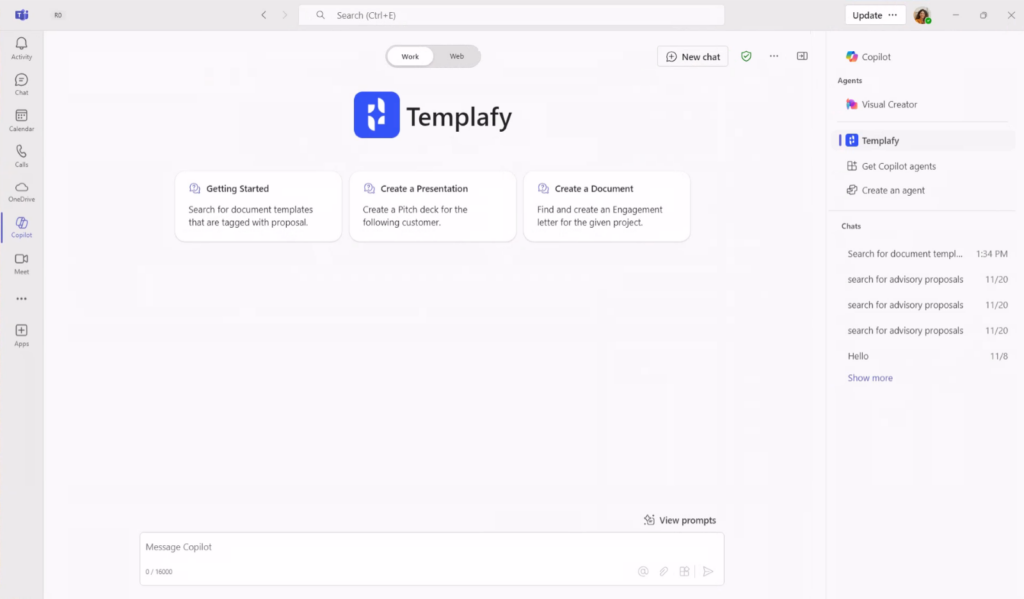
Build your custom agent with Templafy
With the Templafy API, businesses can confidently create smarter document workflows that save time, reduce errors, and make sure every document aligns with their brand and standards.
From automating the generation of contracts, proposals, and engagement letters to enabling workflows with built-in approval processes, Templafy makes sure every step of document creation is efficient, compliant, and tailored to your organization’s needs.
How it works:
- End-to-end automation: The Templafy API connects CRM tools to document templates, automatically pulling data to generate contracts, proposals, or engagement letters.
- Custom workflows: Build workflows with flexibility, whether fully automated or requiring manual oversight in your platform of choice—Copilot Studio or elsewhere.
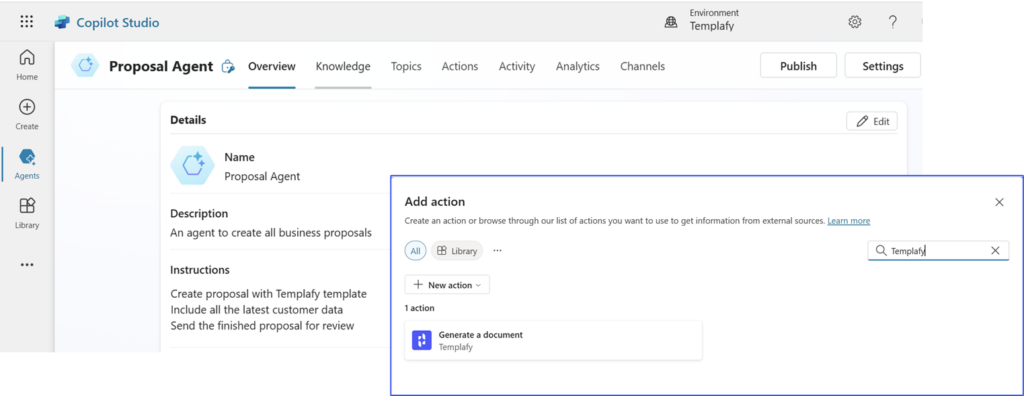
FAQ: Everything you need to know about AI agents
What does an AI agent do?
An AI agent is designed to work independently, handling tasks and making decisions with minimal human input. It can collect data, analyze it, predict the best outcomes, and take action to achieve specific goals—all while staying within the parameters you set. Think of it as a digital assistant that doesn’t just follow orders but finds the smartest way to complete the job.
What are the five types of AI agents?
AI agents come in different forms, and each is suited for specific tasks:
- Simple Reflex Agents: Built to react to the current situation without considering history (like basic rule-based systems).
- Model-Based Agents: Use memory to understand how the environment works and plan actions accordingly.
- Goal-Based Agents: Focus on achieving defined goals, evaluating the best steps to get there.
- Utility-Based Agents: Weigh different options to choose the action with the best overall outcome.
- Learning Agents: Improve performance over time by learning from their experiences.
Is ChatGPT an AI agent?
Not exactly. ChatGPT is a GenAI tool—it generates text based on prompts but doesn’t take autonomous action, like gathering data or triggering workflows. While it’s great for creating content or answering questions, an AI agent goes further by making decisions and managing tasks independently.
Ready to unlock the productivity of AI without the risk?
The best way to learn more about Templafy’s GenAI tools is to see them in action. Request a demo today to see how Templafy’s enterprise-level GenAI boosts productivity, minimizes errors, and keeps every document on-brand and compliant—no matter who’s creating it.


